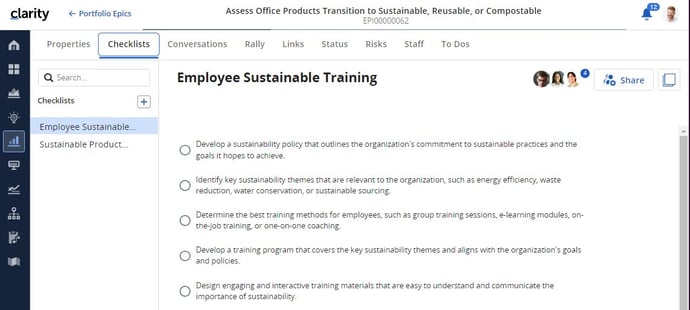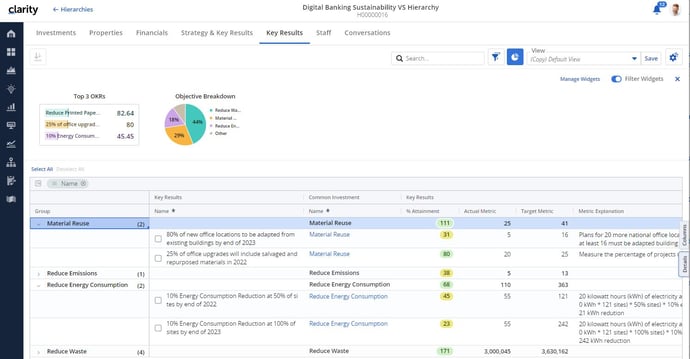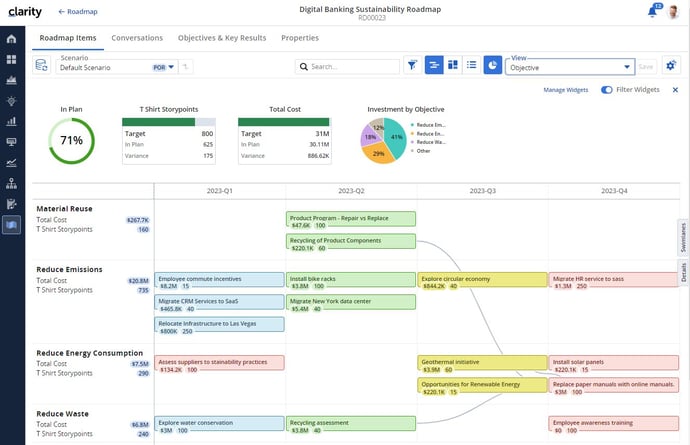As Earth Day approaches, it's essential to reflect on the impact we have on our planet and take action to protect it. One way businesses can make a difference is by implementing sustainable practices. Sustainability isn’t simply a buzzword; it plays an important role in businesses' long-term success. Not only does sustainability benefit the environment, but it also creates a positive impact on a company's reputation, employee satisfaction, and financial performance. In this blog post, we'll explore the importance of enterprise sustainability practices, how organizations can define strategies aligned with sustainability, and how Clarity can help manage sustainability work.
Why Is Sustainability Important for Businesses?
Sustainability is the ability to maintain or improve environmental, social, and economic well-being without compromising future generations' ability to do the same. Businesses can have several drivers for implementing sustainable practices:
- Regulatory compliance. Many countries have implemented environmental regulations, and businesses that do not comply can face significant penalties.
- Business impact. Investors and financial institutions are increasingly looking at sustainability programs as part of their criteria for making loans and funding decisions. Companies that fail to adopt a sustainability plan may therefore have fewer or less favorable loan options, lower valuations, and other negative financial implications.
- Improved reputation. Consumers are becoming more conscious of the environmental and social impact of their purchases. Businesses that prioritize sustainability have a better reputation and are more likely to attract and retain customers.
- Cost savings. Sustainable practices, such as reducing waste and energy usage, can help businesses save money.
- Increased employee satisfaction. Employees are more likely to be engaged and satisfied with their work if they believe they are contributing to a greater good.
How Can Teams Define Strategies That Are Aligned with Sustainability?
Here are some key steps to take for defining strategies and developing a sustainability plan that defines the specific actions needed to achieve sustainability goals:
- Identify sustainability goals and objectives. Teams should first identify their sustainability goals and align them with their overall business strategy. For example, a company in the food industry may aim to reduce food waste or carbon emissions.
- Develop sustainability metrics. Leaders should develop sustainability metrics to measure progress towards their objectives. Metrics could include decreased greenhouse gas emissions, water usage, or waste generation; or improved employee engagement.
- Conduct a sustainability assessment. Teams should conduct an assessment to identify areas in which they can improve their sustainability performance. A sustainability assessment could include analyzing energy usage, water usage, waste generation, and supply chain sustainability. This information can feed into defining the overall organizational goals, metrics, and final plan.
Once a plan is established that defines steps, goals, and metrics, Clarity can provide a powerful platform to manage, collaborate, and visualize these work efforts—while connecting the work execution to the overarching sustainability strategy.
How Can Clarity Help Manage Sustainability Work?
Clarity can help teams manage sustainability work more effectively and better understand how these efforts align with strategies, metrics, and overall business goals. The following are just a few of the ways Clarity supports these efforts.
 Tracking sustainability work efforts and mitigating risks
Tracking sustainability work efforts and mitigating risks
Similar to typical investment management, Clarity enables organizations to plan, track, and report on work execution, including tasks, teams, financials, risks, and status, while connecting it to a strategy such as sustainability.
The solution provides visibility to identify potential issues and manage sustainability risks, ensuring that investments are executed in a way that minimizes environmental impact and complies with regulatory requirements.
Using collaborative work management to support cross-team collaboration
 Since sustainability work often spans the organization and brings together individuals from different corners of the business, it’s very imperative to have a platform that can not only support resource management but empowers this cross-team collaboration.
Since sustainability work often spans the organization and brings together individuals from different corners of the business, it’s very imperative to have a platform that can not only support resource management but empowers this cross-team collaboration.
Collaborative Work Management in Clarity brings team members together to more effectively share updates, track to-dos, and manage overall team progress. Team members receive notifications and utilize dashboards to view and prioritize on all of their to-dos and conversations. All of these features combine to create a powerful one-stop-shop for team members to collaborate and push sustainability efforts forward.

Tracking sustainability Objectives and Key Results
Clarity can help organizations manage their sustainability work as part of their overall portfolio, ensuring that sustainability efforts are aligned with objectives and key results (OKRs). Broadcom ValueOps offers a single system of record to articulate and measure outcomes, work, and value, and to do so consistently across disciplines through an entire value stream.
Clarity can capture both qualitative outcomes and quantitative results to deliver real-time, end-to-end views of how work is progressing toward desired outcomes. These views are synchronized across the organization, providing relevant status and insights for each stakeholder and creating a common understanding of progress and value for everyone.
In short, OKRs can be used to track progress, create alignment, and encourage engagement around measurable goals for organizational sustainability initiatives.

Providing strategic sustainability visualizations and portfolio reporting
Clarity can generate reports on performance to track progress towards sustainability goals, identify areas for improvement, and report on performance to stakeholders.
Utilizing portfolio management functionality in Roadmaps and Hierarchies, teams can analyze data roll ups and metrics across the entire portfolio of work. The solution offers detailed visualizations and widgets to easily analyze data points, such as t-shirt sizing or projected cost, and in the same view, evaluate dependencies and work agreements. Clarity provides powerful portfolio functionality that empowers teams to gain end-to-end visibility of their sustainability goals and progress.

Conclusion
Sustainability is no longer just a "nice-to-have" for businesses; it's an increasingly critical pillar for long-term success. Implementing sustainable practices can have several benefits for businesses, including improved reputation, reduced cost, increased employee satisfaction, and enhanced regulatory compliance. Clarity can help businesses create a collaborative environment for effectively managing sustainability work, teams, and track overall progress. By prioritizing sustainability and using tools like Clarity, businesses can make a positive impact on the environment, and work toward a more sustainable future.

Emma C. Price
Emma C. Price is a seasoned Sr. Product Marketing Manager for Broadcom's ValueOps solution, with over a decade of experience across services, sales, as a customer, and product marketing. Having collaborated with global organizations, Emma possesses a deep understanding of the complex challenges enterprises face in...
Other resources you might be interested in
Clarity 101 - From Strategy to Reality
Learn how Clarity helps you achieve Strategic Portfolio Management.
Working with Custom Views in Rally
This course introduces you to working with custom views in Rally.
Rally Office Hours: February 12th, 2026
Catch the announcement of the new Rally feature that enables workspace admins to set artifact field ordering. Learn about ongoing research and upcoming events.
The Architecture Shift Powering Network Observability
Discover how NODE (Network Observability Deployment Engine) from Broadcom delivers easier deployment, streamlined upgrades, and enhanced stability.
Rally Office Hours: February 5, 2026
Learn about new endorsed widgets and UX research needs, and hear from the Rally team about key topics like user admin, widget conversion, custom grouping, Slack integration, and Flow State filtering.
AppNeta: Design Browser Workflows for Web App Monitoring
Learn how to design, build, and troubleshoot Selenium-based browser workflows in AppNeta to reliably monitor web applications and validate user experience.
DX NetOps: Time Zone and Business Hours Configuration and Usage
Learn how to set and manage time zones and business hours within DX NetOps Portal to ensure accurate data display and optimize analysis and reporting.
Rally Office Hours: January 29, 2026
Learn more about the deep copy feature, and then hear a follow-up discussion on the slipped artifacts widget and more in this week's session of Rally Office Hours.
When DIY Becomes a Network Liability
While seemingly expedient, custom scripts can cost teams dearly. See why it’s so critical to leverage a dedicated network configuration management platform.